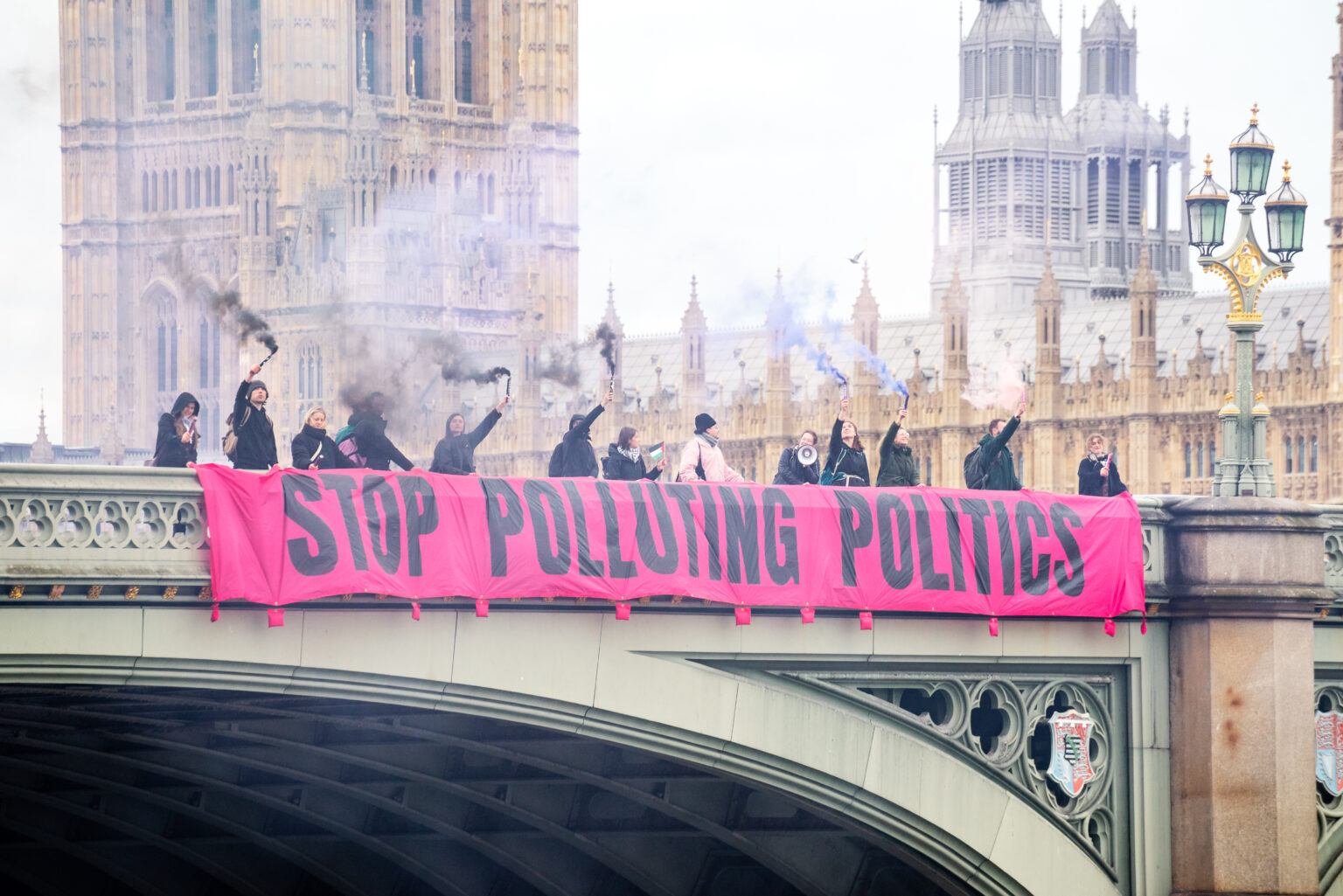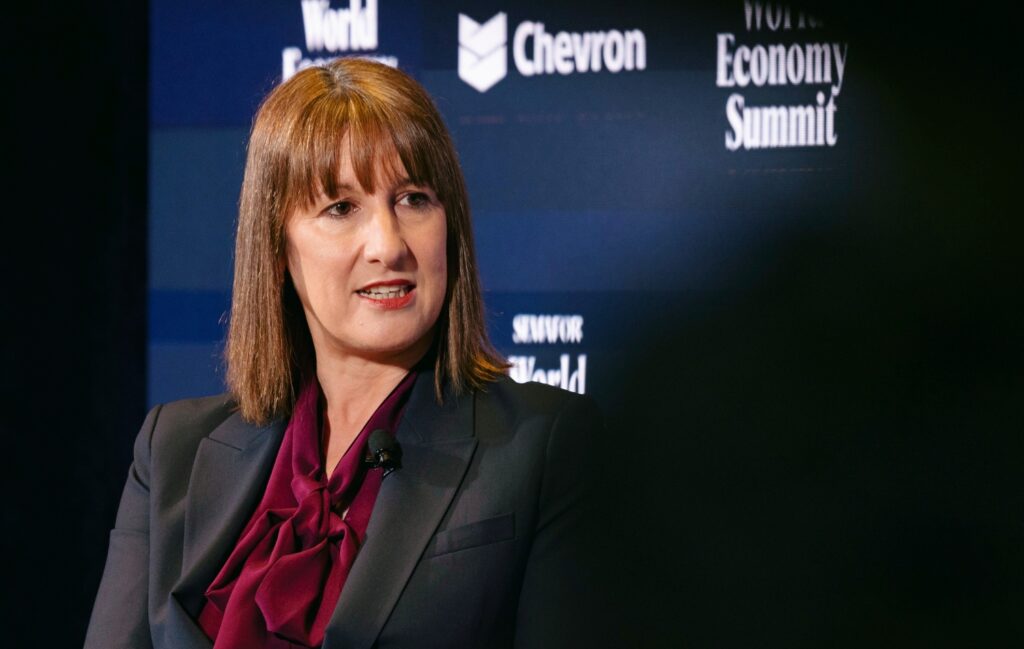A new campaign is calling on MPs to break the fossil fuel sector’s “chokehold” on politics in a critical election year.
Lawmakers returning to work today (Monday) were greeted with smoke flares and a demand to “Stop Polluting Politics” from a banner hung off London’s Westminster Bridge.
The message forms the name of the campaign by Climate Resistance, a new collective that aims “to push the fossil fuel lobby out of Westminster and stop polluters from bankrolling political parties”.
In 2019, under the Conservatives, the UK was the first country in the world to introduce legally binding commitments to reach net zero emissions by 2050.
But since making that commitment in 2019, the party has been criticised for dramatically weakening key climate policies.
In the last year, the Conservatives have delayed the ban on sales of petrol and diesel vehicles, and postponed measures to ramp up the installation of heat pumps in the UK’s gas-reliant homes.
The Conservative Party has regularly accepted donations from polluting interests and climate science deniers, worth £3.5 million in 2022. Two-thirds of the directors in charge of the party’s multi-million-pound endowment fund have a financial interest in oil, gas, and highly polluting industries.
“Politicians are elected to represent the people, not the interests of corporate donors,” Ajaya Haikerwal, a spokesperson for Climate Resistance told DeSmog.
“It’s frankly outrageous that in 2024, oil and gas lobbyists can quite freely cosy up to politicians, hand them fat stacks of cash, and see a favourable change in policy.
“The fossil fuel industry has politics in a chokehold – and this needs to end if we ever hope to achieve any sort of meaningful climate action.”
Fossil Fuel Donations
Scientists, experts and campaigners have been calling for parties to make strong climate pledges ahead of the general election, expected to take place later this year.
Climate campaigners have long warned that the actions of elected representatives in accepting donations from polluting interests raises concern over corporate capture and the influence of polluting donations on policy-making.
Under Rishi Sunak, the Conservatives handed out over 100 new oil and gas licences, and voted through compulsory annual North Sea licensing rounds. In January, DeSmog revealed that Net Zero Secretary Claire Coutinho had received a donation from one of the early funders of the UK’s principal climate science denial group, the Global Warming Policy Foundation (GWPF).
There have also been accusations of a revolving door between the fossil fuel industry and the civil service. Over 100 people from the oil and gas sector have been appointed to top government roles since 2011.
Anti-net zero party Reform UK, which now has one MP, the former Conservative MP Lee Anderson, is polling closely behind the Conservatives. The party, which is registered as a limited company and owned by Nigel Farage, accepted £135,000 from climate science deniers and fossil fuel interests last year, the warmest on record.
Labour MPs have also accepted donations from polluting interests. In February, Shadow Chancellor Rachel Reeves took a £10,000 donation from Lord Donoughue, the former chair of the GWPF.
Millions of Brits will also head to the polls for local elections on 2 May. Conservative Party candidate Susan Hall and Reform UK’s Howard Cox, both of whom have promoted climate science denial, are promising to roll back London’s Ultra Low Emissions Zone (ULEZ) if elected as London’s mayor.
Recent polling suggests that despite the weaponization of green politics by some parties and candidates, public concern over climate change remains high. A July 2023 poll by Ipsos MORI found that 77 percent of Brits consider it a serious global threat, and 77 percent say they find it concerning.
These concerns do not appear to align with the UK government’s action on climate change. In September, an analysis by scientific project Climate Action Tracker downgraded the UK’s overall climate action rating to “insufficient”, adding that it “needs to urgently accelerate climate policy development and implementation to regain credibility on the global stage”.
Need for Action
A sharp reduction in greenhouse gases is widely considered critical to limit the severity and frequency of floods, droughts, heatwaves and wildfires globally.
Scientists at the Intergovernmental Panel on Climate Change (IPCC) have said that without “immediate and deep emissions reductions across all sectors” limiting global heating to 1.5C is beyond reach.
Restricting global temperatures to this threshold – the target agreed as part of the Paris Agreement – would prevent the worst and most irreversible effects of climate change, but the window to do so is rapidly diminishing.
“Flooding, famines and fires – climate change is already on our doorstep. But in the UK, we’re still heavily reliant on fossil fuels, which is driving up our energy bills and pushing people into poverty,” said Haikerwal of Climate Resistance.
“The upcoming general election will be crucial in deciding our climate’s future – whichever party forms the next government must take bold action: rewiring our profit-over-people economy, getting us off volatile oil and gas, and investing in clean, reliable wind and solar.
“By challenging candidates and MPs who get too cosy with polluters and exposing them in public, we will make it politically toxic to associate with these companies.”
Subscribe to our newsletter
Stay up to date with DeSmog news and alerts







